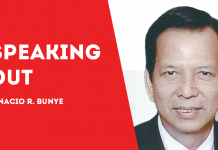
INDEED, the change in circumstances has been significant. There was a time—from the late 1980s to the 1990s—when the insurgency was at its peak. The CPP-NPA-NDF dominated the countryside, striking fear not only among local residents but especially among politicians during election season.
It was an “open secret” that telecommunications companies were compelled to pay millions annually through extortion and revolutionary taxes, particularly on infrastructure like cell towers. Add to that the so-called “campaign fees” collected from politicians seeking to curry favor—or avoid harassment.
The CPP-NPA-NDF also managed to evade the scrutiny of the Anti-Money Laundering Council by setting up an intricate network of conduit NGOs. These front organizations funneled millions of pesos from leftist groups in the Netherlands, Belgium, and other parts of Europe.
It was a lucrative era for the leadership of the communist movement—but, as with all things, it did not last forever.
Today, the CPP-NPA-NDF has been reduced to a small, fragmented group of disheartened, disorganized, and desperate armed bandits. Their ideology no longer sustains them. With 88 out of 89 guerrilla fronts reportedly dismantled, the once-feared insurgency has become a paper tiger—its growl now confined to social media and propaganda channels.
This drastic decline can largely be credited to the creation of the National Task Force to End Local Communist Armed Conflict (NTF-ELCAC) through Executive Order No. 70. Through its Barangay Development Programs (BDP) and the Enhanced Comprehensive Local Integration Program (E-CLIP), the task force has won the hearts and minds of communities in the hinterlands.
What remains of the CPP-NPA-NDF is now an irrelevant and obsolete nuisance. Even their armed members are lining up to surrender, unable to justify their struggle anymore. For many, the New People’s Army is a nostalgic footnote—recalled only by a few aging activists still dreaming of the romanticism of the 1970 First Quarter Storm.
And speaking of the First Quarter Storm:
One of the primary recruitment grounds for the CPP-NPA-NDF has long been the country’s colleges and universities. Under the guise of “student activism,” impressionable youth are enticed to join left-leaning organizations like the League of Filipino Students (LFS) and the College Editors Guild of the Philippines.
Many of these recruits are taken to training camps for immersion and ideological indoctrination. Some go on to become armed fighters, while others are groomed to serve as party-list representatives—such as in Kabataan and Gabriela. The rest become the loud but unwitting “useful idiots” we often see in protests and demonstrations.
On March 29, to mark the founding anniversary of the New People’s Army, a lightning rally was held at UP Diliman. Members of underground organizations brazenly waved CPP-NPA-NDF flags. At the same time, vandals struck at PUP Sta. Mesa, scrawling slogans like “Revolution not Elections.”
These acts can no longer be considered mere activism. They are coordinated displays of allegiance to an internationally recognized terrorist organization.
When slogans openly encourage joining the NPA, and insurgent flags are proudly flown within campus grounds, this crosses the line from dissent to indoctrination, incitement, and active recruitment.
What’s even more troubling is that these incidents occurred within publicly funded institutions—spaces intended to foster critical thinking, not promote armed revolution. The rally at UP was even posted on the Facebook page of The Philippine Collegian, a student publication supposedly dedicated to campus affairs.
Allowing these so-called “useful idiots” of the CPP-NPA-NDF to stage a rally at UP Diliman—while at the same time condemning military veterans who held an Araw ng Kagitingan event at the same campus—is blatant hypocrisy on the part of the UP Office of the Student Regent.
With the battlefield shifting, the CPP-NPA-NDF has pivoted from armed struggle to parliamentary maneuvering. Their political arm, the Makabayan bloc, is now in alliance with the so-called Ayuda bloc in Congress. The insurgency has moved from the jungles to the legislative halls—using the very machinery of government to undermine the state, while benefiting from billions in public funds.
So, how do we make the House of Representatives free of CPP-NPA-NDF influence?
Quite simple, really: Don’t vote for any of the party-list groups aligned with the Makabayan bloc—especially now that they’ve found convenient political partners in the Ayuda bloc./PN







